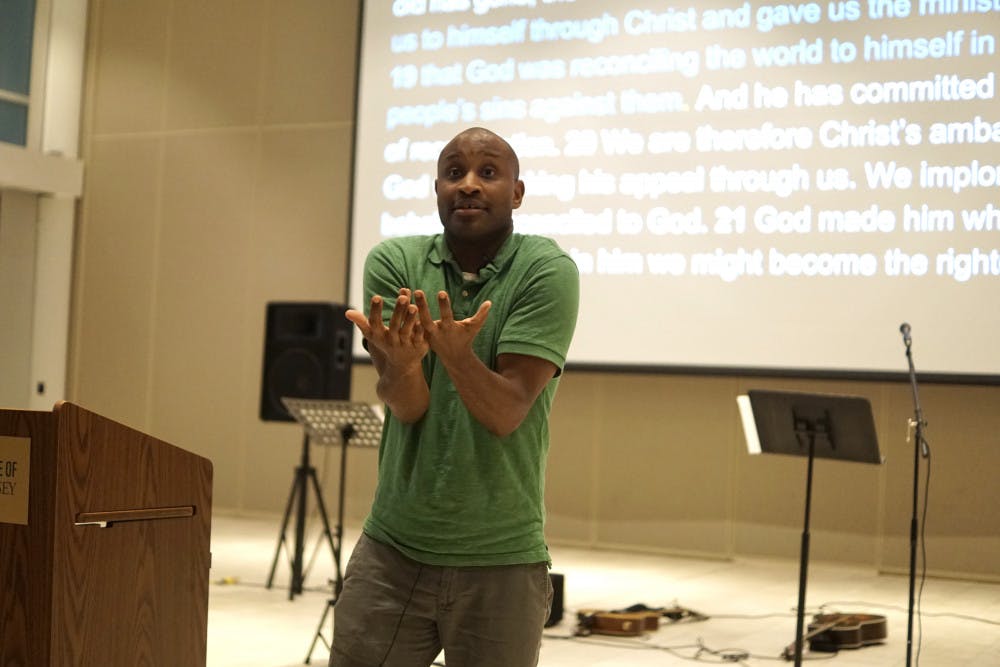By Miguel Gonzalez
News Editor
After a few club announcements and a brief prayer, the New Jersey Christian Fellowship introduced guest speaker Jonathan Walton for the NJCF’s “How does God view diversity?” event in the Student Center Room 100E on Thursday, Sept. 6.
Before diving into his lecture, Walton showed the music video of Joyner Lucas’ “I’m not racist,” a controversial video in which a white man and a black man confront one another. Walton used the video to start a conversation about how God does not judge race and how people can connect to Jesus while confronting current racial issues.
Walton initially talked about racially insensitive incidents happening on college campuses such as Ku Klux Klan members recruiting students, Hispanics being targeted as undocumented immigrants and Chinese students being discriminated against. He used these examples to emphasize that conversations about diversity do not begin peacefully.
“Most of our conversations about race and class and culture do not start with Jesus at the center,” Walton said. “Yes, there are people angry about race and class and status. And the center of the conversation is anger. All of our emotions is at the center of the conversation.”

Walton explained his own ethnic background. Born in Brodnax, Virginia, Walton questioned how people assume he is black despite being 25 percent European with a Cherokee grandmother.
“The country likes to classify me through these boxes, but do these boxes exist in the kingdom of God?” Walton said.
Walton spoke about four different reactions when a racially insensitive incident occurs: appeasers, blamers, computers and distractors.
According to Walton, appeasers want the situation to be contained and forgotten quickly. He points that in Lucas’ music video, the black and white men try to resolve the conflict quickly, before they get to know each other more. Walton uses college campus’ reactions as an example of appeasement.
“Something happens on campus,” Walton said. “The appeasers come out. Let’s send an email. Let’s have a town hall. Jesus had a town hall, but he died on a cross.”
According to Walton, blamers look to further divide people by creating debates.
“People pick sides and people have conversations,” Walton said. “Not really conversations, they’re just debates. We can debate points, we can’t debate faith. We reduce people to the point of the side they take, instead of taking them in the kingdom of God.”
Distractors look to stay away from racially insensitive situations as much as possible, according to Walton.
Walton then emphasized that all racial groups are part of the kingdom of God, but racism is not.
“The skin I received was not a curse — it was a blessing from God,” Walton said. “Brothers and sisters in this room whatever skin color you have, somebody thinks you’re messed up because of it. In the kingdom of God, God says that you are accepted.
After a brief pause, Walton encourages students to not tolerate, but to love all people, regardless of their race, sexuality or disability.
“God calls to love your neighbor,” Walton said. “Pray for your enemies, pray for those who persecute you. God says to love them because everyone is made in his image.”
To cap off his lecture, Walton asserted that white people should not feel guilty about the past oppression of minorities.
“White guilt is not in the kingdom of God, nor is it in the Bible,” Walton said. “It’s destructive, it’s not helpful and it’s not the language in the kingdom of God. It’s impossible to interact with someone and not interact with their history.”
Joshua Bae, a junior communication studies and interactive multimedia double major, recognized the power of unity within Christian communities.
“To me, we as Christians always look to worship God and pray as a community,” Bae said. “Whether it be because of good, bad or struggling times, we are all family in the kingdom of God.”







